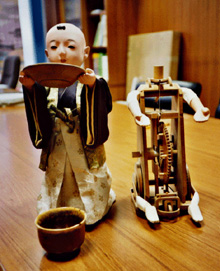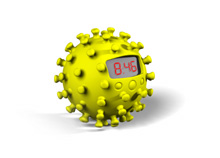Karakuri summer course fuses art with technology

A typical Karkuri by artist Kirsty Boyle, www.karakuri.info

The Anemone Clock, an example of a Karakuri by industrial designer Aaron Tang, www.aarontang.net.
As part of an ongoing effort to involve Concordia in international projects, the Fine Arts Department is inviting students from all disciplines to take part in a Karakuri summer course.
Japanese in origin, karakuri are unique mechanical contraptions devised to tease, trick or take a person by surprise. Unlimited in terms of design or function, modern Karakuri can take the form of an alarm clock that bounces away when you try to turn it off; a fairy in a mason jar that lights up as you approach; nails in the floor which sing like nightingales when trod upon (a trick apparently used by the shogun to warn off intruders).
Karakuri, like Japanese culture, is often misunderstood. In Japanese culture, robots are not just industrial tools, household appliances or toys. They are prized as forms of entertainment and art. A century-old art form, Karakuri have had an indelible effect on the industrial modernization of Japan.
Japan's most famous roboticist, Ichiro Kato, observed that the technology for Karakuri was fused with art, rather than simply a quest for scientific knowledge.
It is in this spirit that the Karakuri Hothouse summer course evolved. The course is intended to create an international forum for cultural understanding and exchange.
The Karakuri Hothouse project is one of many to come from a consortium of five international art schools including the Bauhaus University in Germany, whose media design professor, Peter Benz, initiated the Karakuri project.
In order to facilitate communication between the students and encourage participation, Professor Benz set up a web logging system at http://antville.medien.uni-weimar.de/karakuri and has organized an exhibition to correspond with the 2005 World Expo to be held in the autumn in Aichi, Japan.
All participants in the summer school course will be considered for the exhibition in Aichi and the student with the best work will accompany their Karakuri to the exhibit.
The students will also be encouraged to submit an entry to the International Karakuri Competition, www.karakuri2005.com/en. Their aim, in honour of the 2005 World Expo, is to bring together the “disparate imaginations and creativity of cultures from around the world”.
The Karakuri course begins May 9 and runs for three weeks. Students from all disciplines are welcome, although second-year standing is required as well as a strong base in your chosen medium.
The deadline for the International Karakuri Contest is May 31, and everyone is invited to send in a proposal. Whether or not you take the course, why not create a Karakuri?